This headline: “Pakistan riskiest place to be born, India safer, but not by much: Unicef” in today’s Hindustan Times (a leading Indian national daily) and this manner of presenting the issue by UNICEF exemplifies the way child welfare discourse stigmatises developing nations.
Apparently, (and there is every reason to doubt their statistics, but that is a piece for another time) UNICEF has found that 1 in 22 one-month-olds die in Pakistan. These deaths, it appears, are owing to premature birth, complications during labour and delivery and some severe illnesses such as sepsis (which are likely contracted because of premature birth and/or birth complications). So, what you have is premature babies dying in the first month of birth. Is it fair then to say that it is “risky” to be born in Pakistan? To say so gives the inescapable impression that Pakistan and, by implication, Pakistani families, are failing their own newborns, when what we are looking at is the danger of premature birth. Being born premature is a risk that exists for any premature baby anywhere.
You could say that doctors in Pakistan, or India, or whatever third world country are losing more premature babies than whatever other better off country. That would lay the facts without stigmatising a people, and point to where the weakness lies – in medical technology or expertise, and not with families or society in general. Actually, giving comparative numbers between rich and poor countries on fatalities among premature babies is such an obvious and useful figure to give that it makes you wonder why UNICEF does not do so. I suspect that all countries are doing badly with premies. But not because they are negligent, but possibly because of the opposite – because of trying harder than ever before to push the limits of which premature babies can be saved. Its good to keep trying to save younger and younger neonates. But while you’re still figuring it out you will have high rates of premie fatalities. Does that mean that a country with the most cutting edge premie facilities or a hospital that takes in the least viable premies to try and save them is “riskier” than countries without such facilities or hospitals that don’t take in near-unviable premies? No, ofcourse not. They are no more or less “risky to be born in” than Pakistan or India.
So, we at SaveYourChildren.In wish that papers like the Hindustan Times and the progressive media in general would stop misrepresenting the situation for babies and children in developing countries in this way. Especially because it is really laughable for Indian and Pakistani babies to be classified at “at risk” because of premature fatality rates when on the other hand you have in rich Western countries the widespread phenomenon of babies being born to drug and alcohol-addicted parents, heroin-addicted prostitute mothers, homeless single mothers, schools ever exposed to mass shootings and so on and on and on. What about these risks for children born in these rich countries? Why do risk rankings for newborns never take these factors into account? And why doesn’t the progressive media ask these questions?
Also, to give you an idea of how infant mortality rates might obscure the overall situation in a country – the USA is said to have the highest rate of infant mortality among developed nations. Its still the richest nation in the world and we don’t think, despite the infant mortality figure (assuming it to be true), that it would be fair to say that it is riskier to be born in the USA than in any other Western country. That’s just a confusing and unhelpful way of putting the issue.
New Delhi
20 February 2018
